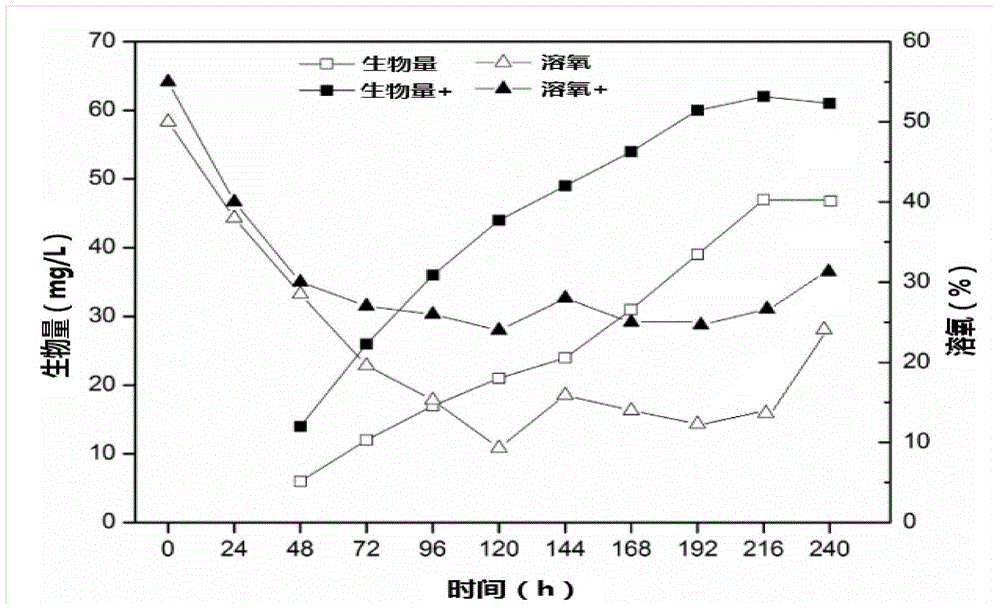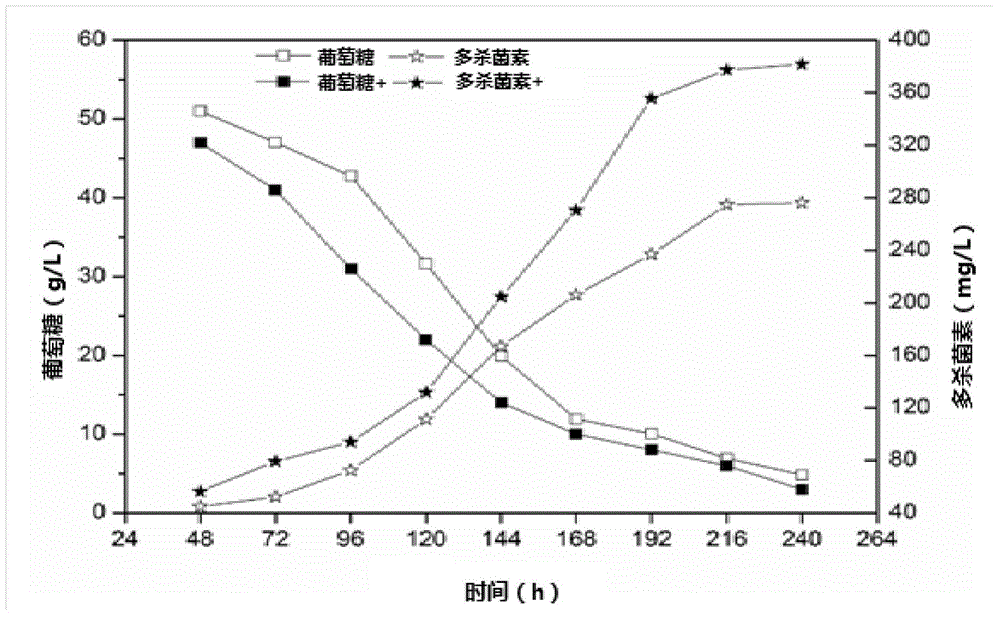Method of increasing yield of spinosad by improving fermentation condition of saccharopolyspora spinosa based on metabonomics
A technology of Saccharopolyspora spinosyn and spinosad, which is applied in the field of improving the fermentation conditions of Saccharopolyspora spinosa to increase the yield of spinosad based on metabolomics, and can solve the problems such as unclear metabolic mechanism
- Summary
- Abstract
- Description
- Claims
- Application Information
AI Technical Summary
Problems solved by technology
Method used
Image
Examples
Embodiment 1
[0075] The method for improving the fermentation conditions of Saccharopolyspora spinosa based on metabolomics to increase the yield of spinosad comprises the following steps:
[0076] (1) Determination of metabolites in Saccharopolyspora spinosa:
[0077] ① Cell collection and quenching:
[0078] Saccharopolyspora spinosa was fermented and cultivated in medium 1, and six time points were taken in the logarithmic phase 62h, 86h, 110h and the stationary phase 134h, 158h and 182h of Saccharopolyspora spinosa fermentation, and 3 samples were taken at each time point. For each sample, 5ml of fermentation broth, mix the sample with 18mL of quenching solution and place it for 5min, centrifuge at 3000rpm, 4°C for 3min, discard the supernatant; wash with distilled water at 4°C to remove the culture medium components on the cells ;3000rpm, 4°C, centrifuge for 3min, discard the supernatant, keep the bacteria; wash repeatedly 3 times;
Embodiment 2
[0145] The method for improving the fermentation conditions of Saccharopolyspora spinosa based on metabolomics to increase the yield of spinosad comprises the following steps:
[0146] (1) Determination of metabolites in Saccharopolyspora spinosa:
[0147] ① Cell collection and quenching:
[0148] Saccharopolyspora spinosa was fermented and cultivated in medium 1, at six time points of log phase 62h, 86h, 110h and stationary phase 134h, 158h and 182h of Saccharopolyspora spinosa fermentation, and 4 samples were taken at each time point For each sample, 8ml of fermentation broth, mix the sample with 19mL of quenching solution, place it for 8min, centrifuge at 4000rpm, 4°C for 3min, discard the supernatant; wash with distilled water at 4°C to remove the culture medium components on the cells ;4000rpm, 4°C, centrifuge for 4min, discard the supernatant, keep the bacteria; wash twice;
[0149] Quenching solution is the same as Example 1, and medium 1 is the same as Example 1;
...
Embodiment 3
[0177] The method for improving the fermentation conditions of Saccharopolyspora spinosa based on metabolomics to increase the yield of spinosad comprises the following steps:
[0178] (1) Determination of metabolites in Saccharopolyspora spinosa:
[0179] ① Cell collection and quenching:
[0180] Saccharopolyspora spinosa was fermented and cultured in medium 1, and at six time points of logarithmic phase 62h, 86h, 110h and stationary phase 134h, 158h and 182h of Saccharopolyspora spinosa fermentation, each time point was sampled 5 For each sample, 10ml of fermentation broth, mix the sample with 20mL of quenching solution and place it for 10min, centrifuge at 5000rpm, 4°C for 5min, discard the supernatant; wash with 4°C distilled water to remove the medium components on the cells ;5000rpm, 4°C, centrifuge for 5min, discard the supernatant, keep the bacteria; wash 4 times repeatedly;
[0181] The quenching solution is a methanol aqueous solution with a volume concentration of...
PUM
| Property | Measurement | Unit |
|---|---|---|
| concentration | aaaaa | aaaaa |
Abstract
Description
Claims
Application Information
 Login to View More
Login to View More - R&D
- Intellectual Property
- Life Sciences
- Materials
- Tech Scout
- Unparalleled Data Quality
- Higher Quality Content
- 60% Fewer Hallucinations
Browse by: Latest US Patents, China's latest patents, Technical Efficacy Thesaurus, Application Domain, Technology Topic, Popular Technical Reports.
© 2025 PatSnap. All rights reserved.Legal|Privacy policy|Modern Slavery Act Transparency Statement|Sitemap|About US| Contact US: help@patsnap.com



